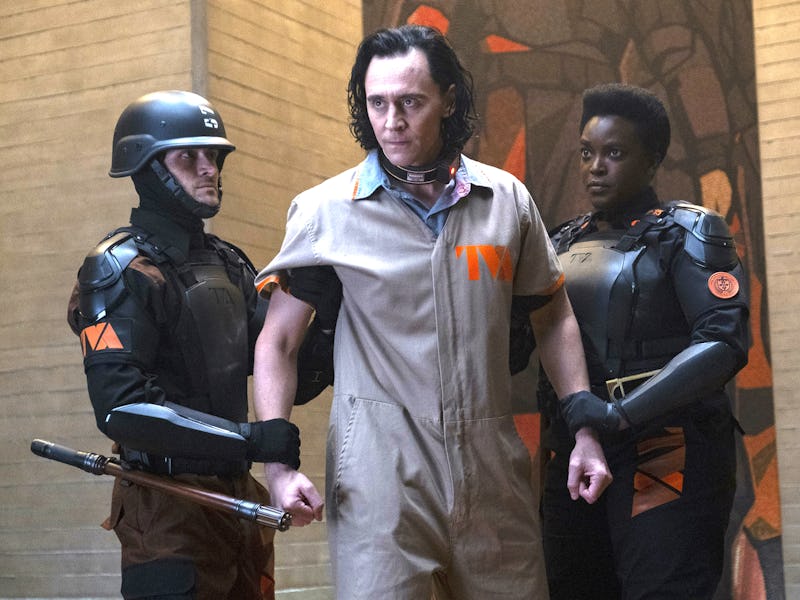Loki is changing the MCU forever in one huge metaphysical way
Underneath the time travel hijinks is an ancient dilemma.

For a franchise about purple aliens and superheroes in spandex, Marvel’s Disney plus shows have been surprisingly deep.
WandaVision tricked sitcom fans into watching a heartbreaking exploration of PTSD and grief, while The Falcon and the Winter Soldier explored the racism and fascism that define American society. But with Loki, the Marvel Cinematic Universe is tackling something even bigger: the meaning of life itself.
In Loki Episode 1, the God of Mischief comes face to face with his own future — and he doesn’t like what he sees. This moment actually brings to the forefront a question that has plagued philosophers for eons: do we have control over our own fate?
Loki vs. free will
According to Loki, there’s one timeline that is sanctioned by the mysterious “Time Keepers” known as the sacred timeline. Anything that happens during the sacred timeline must happen, or else the timeline branches off and risks the formation of a multiverse. The Avengers’ fight with Thanos, the Blip, and every aspect we’ve seen in the MCU so far is along this timeline — including Loki’s death and the destruction of Asgard.
Obviously, Loki (fresh off The Avengers in 2012) isn’t thrilled with what lies in his future, so he decides to play along with the TVA’s rules in exchange for an audience with the Time Keepers themselves. But this just begs the question...
Who gave the Time Keepers the authority to discern the sacred timeline?
It’s a question Tom Hiddleston asked himself while preparing for the role.
“Can we trust the TVA? They have defined themselves as benevolent guardians of a tidy timeline,” he tells Inverse. “And if ever there's a branch that they think isn't quite right they could prune it. But is that also taking people's choice and agency away. Who gets to make those determinations?”
“Can we trust the TVA?”
Who indeed? These questions feed into one of the oldest philosophical debates ever: how can the concept of determinism coexist with free will?
Or, in terms of Loki, if the Time Keepers decide what is or isn’t part of the “sacred timeline,” does anybody really have any control over their actions?
Loki and determinism
Mobius and Loki look back on some dubious choices
The concepts of “free will” and “determinism” date back to Ancient Greece, and ever since, philosophers have wondered just how much control we have over our own actions. The concept of the lack of free will, or determinism, can be further dissected into many categories, including:
- Causal determinism — This theory states that as a result of what happened before, what happens next is inevitable (much like Thanos)
- Fatalism — According to fatalism, whatever happens is what is fated to happen, so there’s no sense in trying to change it.
- Theological determinism — This is more or less what the TVA believes, that there’s an infallible higher power that discerns what is or is not going to happen in the future.
Theological determinism is mainly found within religious belief systems, where prayers are offered up for guidance, and solace is found in trusting some greater “plan.” It can be a relief to rely on a higher power for the seemingly random events of the universe, but it does come with the cost of personal agency.
Does anyone in the MCU have free will?
The TVA works under the authority of the three Time Keepers.
Well, to a point. The MCU seems to exist in a world of predeterminism where the Time Keepers know what will happen in the future because they’re dictating the timeline every single person in it.
The only time the TVA, and by extension the Time Keepers, enact their authority is when unsanctioned time travel occurs. The Avengers conducting a time heist? That’s apparently part of the pre-approved timeline. Someone else going back in time to steal an Infinity Stone when they’re not supposed to? That’s a one-way ticket to a TVA trial.
Hypothetically, in a Marvel world without time travel at all, the TVA wouldn’t be necessary as everything would happen precisely as it was predetermined to, with everyone doing what they feel is right within the moment.
What predeterminism means for Loki
Loki better make a compelling case in order to change the Sacred Timeline.
Unfortunately for Loki, what happened in the Sacred Timeline (and in his TVA file) would’ve happened regardless. His only chance to change his future is to plead his case to the Time Keepers, but that involves its own challenges. Namely, if the timeline really is “sacred,” can it ever be changed?
It’s too soon to say for sure, but it seems pretty likely that by the end of Loki, the sacred timeline will be no more. (How else do we get to Doctor Strange in the Multiverse of Madness unless Loki cracks the Multiverse wide open?)
That means that while everything in the MCU before Loki existed in a world defined by determinism, whatever comes next could be a lot more freewheeling. For Loki himself, that could mean another shot at his life. And for the future of Marvel movies, it means a lot more chaos.
Believe it or not, these last three phases of the Marvel Cinematic Universe were carefully predetermined (and not just by Kevin Feige). Whatever comes next is going to be a lot weirder.
Loki is now streaming on Disney+.